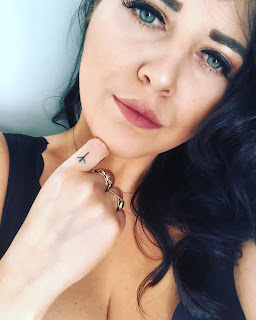The Fjordhammer Project: Finding Folklore - Sophie Symons
Someone once told me that in order to consider yourself a writer, you simply need to take the time to write. I’ve written creatively for as long as I can remember, in fact, my sister took the opportunity to embarrass me at my recent wedding with a recital of some of my earliest poems. There is one that details the minutiae of my emotional response to falling off a horse that makes my skin crawl.
During the latter years of secondary school, writing took a backseat as an interest in boys became more acute. My old poetry books were abandoned and replaced by gig tickets and booze. But as the end of my final school year approached, I decided that I wanted to pursue my childhood passion at university and was fortunate to be accepted to study Creative Writing at undergraduate level.
Truthfully, completing my degree squashed some of the joy of writing for me. Elements of the course felt clinical, especially in my third year. Where I would once write for myself in a spontaneous and intuitive way, I was now writing to fulfil requirements, to hit specific markers. I felt constrained by the structures of each semester. By the time I left university, I struggled to sit in front of a blank page and let my imagination run away as it did before.
In the years that followed, I felt a little lost in terms of my place as a creative. I was employed for a time as a Merchandiser in a department store, which was exhausting but appealed to my interest in fashion and aesthetics. I wrote articles for a music website. I started a band and sang some quaint folk songs. I ran an eBay thrift store with my sister. Ultimately, these were just holding projects while I waited for my love of long form creative writing to be reignited.
I’ve always known that I had a novel in me, and it’s always been my personal Everest. Ideas have come and gone – love stories set in Medieval England, adventures in most northerly Scandinavia, Noir thrillers in New York – but have never stuck around for longer than the plotting process. I might have drafted the first couple of chapters, at a push.
Almost five years ago, I experienced some personal turmoil which led to a period of intense darkness for me. I felt wrecked but, more concerningly, despondent and uninterested. I knew that to feel better I needed to make some drastic changes to my lifestyle. I couldn’t see a happy life for myself in my environment as it was. So, I moved from my home in Oxford, where my friends and family lived, to most westerly Wales and a little house by the sea.
At that time, I don’t think I really considered how that decision might forge my character, but the following six months were some of the most exciting, awe-inspiring, and challenging of my life. I arrived, with a Smart Car full of my belongings and a yearning for something more. Three years later I still use the lessons I learned during that time to guide my decision-making.
Anyone who has been to Pembrokeshire knows that it is a place steeped in history, folklore and mystery. I would have struggled not to have been inspired by it. Every day was learning and adventure – hikes along the dramatic coastal path, pilgrimages to sacred standing stones, kayaking trips out to haunted caves. But it was also effort – making brand new friends for the first time in at least ten years, learning to be fully and comfortably alone, facing a difficult truth about myself.
Although I’d long held a casual interest in hearing ancient tales, encountering mythologies and exploring antiquities, this was accelerated to an active pursuit of the stories that carved themselves into the core of this place I’d grown to love. Within a couple of weeks of being there, I started to write again.
When I returned to Oxford, I began to look for folklore wherever I went. It was comforting to embed myself in enchanted narratives whilst trying to find a new place in my old world. They helped me to understand it better. I would read books dedicated old wives’ tales, words that painted our history more vibrantly than any history textbook could. So much is exposed in the telling of seemingly innocuous fable – the living conditions of the time, societal structure, people’s fears and hopes. If you look and listen closely, you gather a sense of what the people who first told them might have been like, what they might have experienced.
To me, folklore is a fluid thing. You can’t bend it to your individual will and hope it stays that way. It’s forever evolving, being added to and enhanced. Before long, elements of ancient Norse, Celtic and Japanese lore started to knit itself into my writing. I’ve started to see my role as a writer in a different way because of it, too. I no longer write for me alone, but think of myself and all writers, as vessels for stories that should be told. Whether we borrow directly from the past in order to do that, or we try and establish our own route, we’re really just narrators.
I’ve just finished the second draft of my first novel and reignited a long-neglected blog on which I celebrate folklore of the ocean - stories of sea witches, sailor superstitions and monsters of the deep. The latter is an ode to that little house I lived in by the sea. I know that a lot of the motivation to conquer my Everest has come from reading the stories of the folk who came before me. But it’s also come from falling in love with myself, as well as my wonderful husband, and feeling ready to weave some magic of my own.



Comments
Post a Comment